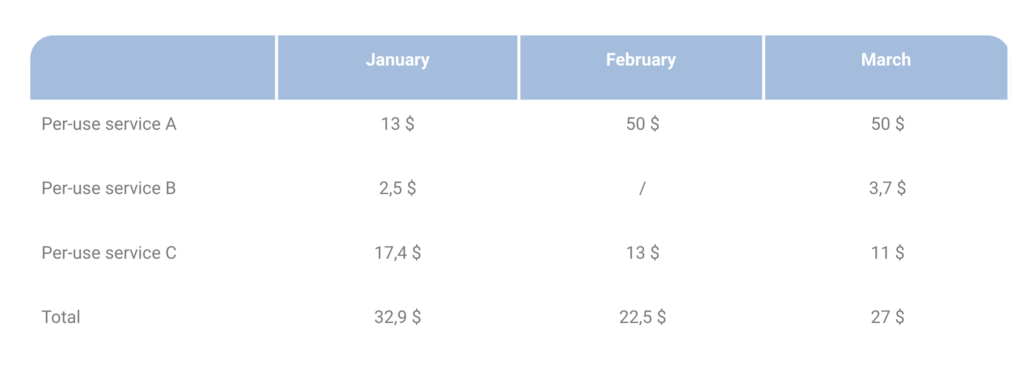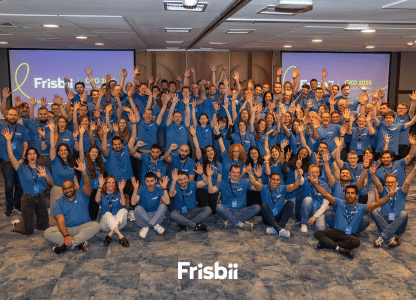What is consumption-based billing? #
Pay for only what you use. This is the very simple principle behind usage-based billing. As a logical extension of the subscription economy model, the usage economy has been increasingly successful over the past few years, especially in B2B.
As popular as it may be, the subscription economy faces some limitations. Who would pay a fixed monthly subscription fee for a service whose use fluctuates from month to month? Well, you don’t have to look too far to convince yourself otherwise. Just have fun comparing a company’s peak activity in August and then in September. It’s usually easy to do the maths!

Consumption-based billing provides a practical solution to such irregularities regarding a given service’s use. It’s flexible and can be adapted to all types of companies. Pricing can be based on the number of users for an application, the time spent on software or the volume of data consumed for a storage system.
Consumption-based billing: a hybrid business model? #
When it comes to pay-as-you-go, there are two main models:
- a hybrid model between a traditional subscription and complementary services based on usage-based services, which makes it possible to expand the basic offer while securing a fixed income
- an on demand model involving usage-based services combinations, designed to be as close as possible to each customer’s needs.
This second model is more attractive for the client, but also more risky for the service provider. Actually, it’s difficult to accurately estimate revenues when they vary each month according to customer consumption. For greater comfort and better control of their cash flow, most companies therefore tend to favor a hybrid formula between subscription and usership economy.


Usership economy: challenges and benefits #
The usership economy responds to many current challenges. On the one hand, service providers are trying to stand out by offering increasingly innovative services, in line with consumers’ desire for flexibility. On the other hand, customers aspire to greater price transparency, while enjoying quality services. The way is thus paved for pay-per-use billing.
Customer benefits #
The main interest of consumption-based billing lies in the savings that a customer is able to make. Indeed, this economic model advocates cost transparency. A customer can thus define and adjust his expenses without having to worry. Consequently, there is no risk of unpleasant surprises at the end of the month. He only pays for what he has used and makes sure that he gets the best return on his investment.
Similarly, it’s much easier for a customer to test a new service through the economy of use. There is no question of making a bet on the future. If the service does not provide satisfaction and proves to be unprofitable, the investment made remains under control. This is why this limitation of financial risks is particularly appreciated by clients seeking to develop their business through innovative services.
Business benefits #
In order to attract and retain new prospects, a company needs to provide the best possible experience. With this in mind, pay-per-use billing helps to build trust with customers. By analyzing a customer’s consumption data, the company can, for example :
- warn a user that his consumption threshold is about to be exceeded;
- make a promotional gesture on a product or service that is widely appreciated by a customer
- offer another service that seems to be more appropriate to the customer’s needs.
These actions may seem trivial, but they contribute to strengthening customer satisfaction. The more satisfied a consumer is, the more they will become attached to your services and recommend them. Is this a virtuous circle?
Offering pay-per-use services also help a company generate additional revenue. Coupled with a classic subscription, these additional services billed by usage are an effective lever to expand the offer subscribed by customers.
To sum up, more and more companies are adopting usage-based billing as part of their business model. As it can be applied to most business sectors (IT, energy, industry, etc.), pay-per-use services attract a wide range of customers who are used to working on a just-in-time basis.
Frisbii can help you with your recurring revenue needs. Set up a first free consultation meeting to find the right solution for automation, optimization and scaling.



